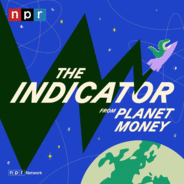All of us negotiate — whether it's accepting a job offer, buying a house or working out who does the dishes. Economist Daryl Fairweather has a new book out: Hate the Game: Economic Cheat Codes for Life, Love, and Work. It's all about the negotiation lessons she's learned through the research, her own career and Destiny's Child. Related episodes: What women want (to invest in)A conversation with Nobel laureate Claudia Goldin (Update) Summer School 7: Negotiating and the empathetic nibble For sponsor-free episodes of The Indicator from Planet Money, subscribe to Planet Money+ via Apple Podcasts or at plus.npr.org. Fact-checking by Sierra Juarez. Music by Drop Electric. Find us: TikTok, Instagram, Facebook, Newsletter. Learn more about sponsor message choices: podcastchoices.com/adchoicesNPR Privacy Policy

Wirtschaft
The Indicator from Planet Money Folgen
A bite-sized show about big ideas. From the people who make Planet Money, The Indicator helps you make sense of what's happening in today's economy. It's a quick hit of insight into money, work, and business. Monday through Friday, in 10 minutes or less.
Folgen von The Indicator from Planet Money
300 Folgen
-
Folge vom 19.05.2025The Art of the Deal ft. Beyoncé
-
Folge vom 16.05.2025Brain-controlled iPhones, a Japanese asset buy-a-thon, and Trump tax cut debtIt's ... Indicators of the Week! Our weekly look at some of the most fascinating economic numbers from the news. On today's episode: Japanese asset buyers make it rain, an iPhone ... powered by the brain?! And, how are we going to pay for these Trump tax cuts? We explain! Related episodes:What's going to happen to the Trump tax cuts? (Apple / Spotify) Slender Starbucks, Medicaid at risk, and the gold card visa (Apple / Spotify)For sponsor-free episodes of The Indicator from Planet Money, subscribe to Planet Money+ via Apple Podcasts or at plus.npr.org.Fact-checking by Sierra Juarez. Music by Drop Electric. Find us: TikTok, Instagram, Facebook, Newsletter. Learn more about sponsor message choices: podcastchoices.com/adchoicesNPR Privacy Policy
-
Folge vom 15.05.2025Bond market nightmaresIn early April, the bond market gave people a scare. Investors began selling off their historically secure U.S. Treasuries in large quantities. It reportedly encouraged President Trump to pause his flurry of liberation day tariffs. These jitters offered a glimpse into what could go wrong for U.S. Treasuries if economic uncertainty gets worse. On today's show, we take a peek at some nightmare scenarios for the bond market.Related episodes:Who's advising Trump on trade (Apple / Spotify)IRS information sharing, bonds bust, and a chorebot future (Apple / Spotify)Bond vigilantes. Who they are, what they want, and how you'll know they're coming (Apple / Spotify)Is the reign of the dollar over? (Apple / Spotify)For sponsor-free episodes of The Indicator from Planet Money, subscribe to Planet Money+ via Apple Podcasts or at plus.npr.org.Fact-checking by Sierra Juarez. Music by Drop Electric. Find us: TikTok, Instagram, Facebook, Newsletter. Learn more about sponsor message choices: podcastchoices.com/adchoicesNPR Privacy Policy
-
Folge vom 14.05.2025What we misunderstand about gun violenceThe U.S. is known around the world for its problem with gun violence. The vast majority of murders in the U.S. are committed using guns. But what leads one person to shoot another? The "conventional wisdom" says gun violence is usually the act of calculated criminals or people acting out of desperate economic circumstances. But economist Jens Ludwig believes the conventional wisdom is wrong. Today on the show, he explains why he believes many of us fundamentally misunderstand the problem of gun violence and how behavioral economics reveals some potential solutions. Jens's new book detailing his research into gun violence is called "Unforgiving Places: The Unexpected Origins of American Gun Violence".Related episodes:Can credit card codes help address gun violence? The money going into and out of gun stocksGuns and The Trump SlumpFor sponsor-free episodes of The Indicator from Planet Money, subscribe to Planet Money+ via Apple Podcasts or at plus.npr.org.Fact-checking by Sierra Juarez. Music by Drop Electric. Find us: TikTok, Instagram, Facebook, Newsletter. Learn more about sponsor message choices: podcastchoices.com/adchoicesNPR Privacy Policy
